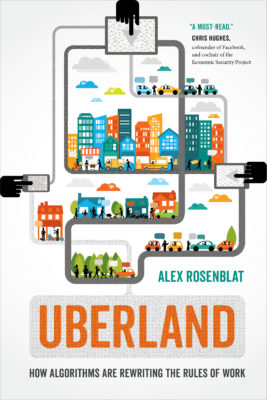It’s hardly news that “sharing economy” tech – Uber, Airbnb, gig services like Fiverr, sponsored social media content – is changing how we live and earn a living. But somehow their politics seem fuzzy. Are they democratizing the means of production or nudging hard-working folks out of steady jobs? Creating opportunities or entrenching new forms of control? Disrupting calcified service sectors or sidestepping labour laws? In short, are they freeing us or exploiting us?
In Uberland: How Algorithms Are Rewriting the Rules of Work, Alex Rosenblat argues that this confusion isn’t entirely accidental. She digs into how these apps use the language of disruption and algorithmic neutrality as a wedge to drive change. Rosenblat studies Uber, specifically, but she’s interested in how the ridehail service points to a larger trend of “tech washing” aggressive or unsavoury business practices (she eschews the term “rideshare,” which connotes an altruism the service hasn’t quite earned). By framing their services in terms of technological exceptionalism, worker and consumer empowerment, and sunny-vibe social goods like sharing, they rid themselves of both inconvenient regulatory systems (labour laws, zoning, tax regimes) and existing infrastructure while winning consumers’ hearts and minds by lowering the cost of services.

Uberland
How Algorithms Are Rewriting the Rules of Work
Alex Rosenblat
University of California Press
$33.95
cloth
296pp
9780520324800
While the chronically unsympathetic Uber organization dangles a lot of low-hanging critical fruit, Rosenblat concentrates on how it structures the drivers’ work. Uber demurs from claiming drivers as employees, positioning them instead as both independent contractors and “consumers” of Uber’s technology, like their riders. So, Uber doesn’t pay minimum wage or adhere to labour laws – but they do perform background checks, vet and finance cars, process payments, resolve conflicts, control the dispatch, and they can penalize or suspend (i.e., fire) drivers. They also habitually withhold information about a ride’s destination (which tells a driver whether it will be profitable for them to take it) and cap refusal rates, effectively barring any ability to make informed decisions about how one’s business is run. In short, Uber may not “employ” drivers, but their algorithms certainly manage them.
In 2017, while Rosenblat was building her case against the ridehail giant, Uber had its Very Bad Year. Each week saw some new scandal unveiled – structural sexual harassment, a toxic CEO, “greyball” cars used to dodge law enforcement, scabbing while taxi drivers struck against Trump’s immigration ban – and few were left with any illusions about Uber’s ethics (or those of its equally unappetizing Peter Thiel-funded rival, Lyft). But in Rosenblat’s analysis, all of this is beside the point – the bigger story is how tech services in general hide behind the myths that tech is neutral, and change is always good.
Rosenblat writes how tech “has operated with low regulatory oversight because it successfully persuaded regulators, and society, that low regulation is essential to innovation.” At the same time, she shows how “invasive algorithmic management” acts as a blind for organizational decisions – we didn’t forget to pay out drivers’ tips; it was a glitch! The computer decides how much your work is worth! While some of the specifics she chronicles may be unique to Uber, as we increasingly delegate the management of our lives and livelihoods to apps, Uberland is a worthwhile reminder that in the digital economy, the people who write the algorithms also write the rules. mRb






0 Comments